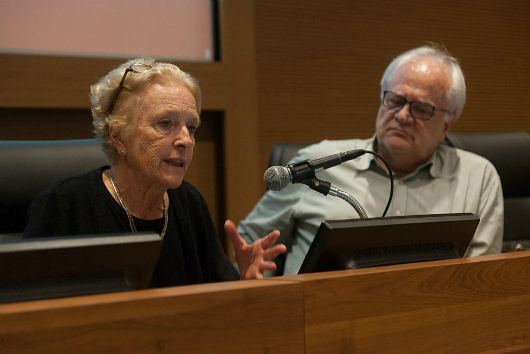Public health formation in Cuba and Brazil in discussion
23/06/2017
Tatiane Vargas e Pedro Leal (Ensp); Talita Rodrigues e Júlia Neves (EPJV)
Two colloquiums at the Fiocruz campus in May discussed public health formation and the role of forming institutions in the governance of health services, programs, and systems in Brazil and Cuba.
Public health teachers, directors, and students of institutions in Brazil, Cuba, and other Latin American countries gathered from May 8 to 10 to share and discuss experiences, opportunities, and challenges at the I Latin American Colloquium on Formation in Public Health and at the III Brazil-Cuba Colloquium on Formation in Public Health.
The main subjects discussed included how to incorporate the experiences and challenges of other neighboring centers responsible for forming and qualifying strategic staff for the health systems in the region.
The Sergio Arouca National Public Health School (Ensp/Fiocruz), the Joaquim Venâncio Health Polytechnical School (EPSJV/Fiocruz), the South American Institute of Governance in Health (Isags/Unasur), and the National Institute of Hygiene, Epidemiology, and Microbiology (Inhem/Cuba) were responsible for the seminar.
At the opening ceremony, Marco Menezes, representing Fiocruz's presidency, stressed the significance of conducting the event for Latin America, mainly due to the political moment, when the population is losing huge right losses. “An event as this helps us to articulate the formation in public health in Latin America even more. It also helps use to see and understand health in a wider way”, he said.
For the director of the Cuban National Public Health School Lázaro Díaz, broadening the Brazil-Cuba Colloquy was an enormous felicity, as a country can become even better with a good formation in health. The vice-director of the National Institute of Hygiene, Epidemiology, and Microbiology (Inhem/Cuba) Disnardo Raúl Pérez stressed the significance of reinforcing the formation in public health in his speech.
For the director of the Cuban National Institute of Workers' Health (INSAT) Waldo Díaz, the Colloquy represented an opportunity for us to know which formation in public health we want, besides knowing the experiences from other sibling countries. The dean of the Health Technology College of Havana/Cuba Antonio Rodríguez evaluated the Colloquy conduction as a time to harmonize the formation in public health.
Isags's director, Carina Vance, defended the significance of widening the participation of countries more and more for a greater understanding in public health. In his speech, ENSP's director Hermano Castro underlined the current moment in the country, with economic difficulties, daily attacks to SUS (Unified Health System), and loss of labor and social security rights, and the significance of forming a health staff that can fight for and defend SUS in such scenario. “I expect that we'll have rich discussions during these three days and, more than that, I expect that ideas and proposals for the Unified Health System will be generated here, for us to advance even more in a worthy health for everyone”, he said.

Hermano Castro, director of the Sérgio Arouca National School of Public Health (Picture: Virgínia Damas)
Who are the Latin American sanitarians nowadays?
One of the highlights in the Colloquy was a great health thinker in Latin America, with recognized academic career and acting in public administration, the Mexican-naturalized Swedish sanitarian Asa Cristina Laurell. In her presentation, she asked Who are the Latin American sanitarians nowadays? A view of the social medicine/collective health. The conference was coordinated by the ex-chairman of Fiocruz and director of Fiocruz Global Health Center (Cris/Fiocruz), Paulo Buss.
Asa Cristina Laurell divided her speech in some topics. She cited Mario Testa and the Latin American sanitarians, besides speaking about the complexity of the health field; about the trajectory of the contradictory relationship between public health and social medicine/collective health; about institutional policies and practices; and about education in public health in the scope of collective health. According to her, Mario Testa claimed that “Latin American sanitarians are the most frustrated professional group, as they perfectly know what they have to do and are not able to do”. Then, she showed some initial explanations as, for example, the relationship between social medicine and socioeconomic processes and the health (disease) conditions of specific classes or social groups; and the direct relationship of collective health and the construction of the Unified Health System (SUS).

Asa Cristina Laurell and Paulo Buss (Cris/Fiocruz) (Picture: Pedro Linger)
The sanitarian also commented on the trajectory of a contradictory relationship between public health and social medicine/collective health. Between the 1970s and the 1980s, there was a developmental criticism in public health and its method; later, there was theoretical-methodological construction itself. “Thus, the premise of the historical-social determination of knowledge, health practices, and the collective and individual health-disease process appeared", she explained. The institutional policies and practices were also present in Asa Cristina Laurell's presentation. According to her, there were some premises to recover the conception of collective health/social medicine, being among them: accumulation pattern, economic policy, social policy in two axes (wage-job benefits and social services), and health policy of the social policy.
Finally, Asa Cristina Laurell talked about the education in public health in the scope of collective health. According to the sanitarian, the public health focusing collective health/social medicine has basic conceptions that modulate teaching, such as determination notions and determining processes, health as a right, ethic in health, and public ethic. She also cited the basic elements of a health policy, which needs to have the health system basic features, basic notions of the health legislation, and attention models, besides active social participation. Finishing, Asa Cristina Laurell also referred to a solid technical formation, the technical knowledge of commercial practices, and the leadership issue.
The full coverage of the Colloquy may be checked out at Ensp's website in Portuguese.
Check out the whole lecture by Asa Cristina Laurell. Other videos are available on Youtube.


